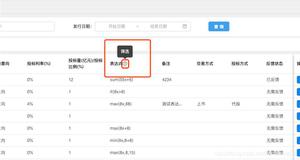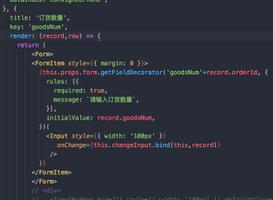关于el-table二次封装插槽slot的问题?
先看下面我的el-table二次封装相关代码。
index.vue
<el-table ref="table"
v-loading="searching"
:data="pagedData"
:border="border"
stripe
highlight-current-row
v-bind="$attrs"
v-on="$listeners"
@selection-change="handleSelectionChange"
>
<template v-for="(item, index) in columnList">
<el-table-column
v-if="item.slotScope"
:key="item.prop + index"
v-bind="item"
:label="$t(item.label)"
>
<template slot-scope="scope">
<slot
:name="item.prop"
v-bind="scope"
>
{{ "-" }}
</slot>
</template>
</el-table-column>
<el-table-column
v-else-if="item.selection"
:key="`selection${index}`"
type="selection"
:width="item.width || 50"
:align="item.align || 'center'"
/>
<column
v-else
:key="item.prop + index"
:column="item"
/>
</template>
</el-table>
column.vue
<template> <el-table-column
center
v-bind="column"
v-on="$listeners"
:label="$t(column.label)"
>
<!-- <template
slot="header"
slot-scope="scope"
>
<render
v-if="column.renderHeader"
:scope="scope"
:render="column.renderHeader"
/>
<span v-else>{{ scope.column.label }}</span>
</template> -->
<template slot-scope="scope">
<render
v-if="column.render"
:scope="scope"
:render="column.render"
/>
<!-- 嵌套表格 -->
<template v-else-if="column.children">
<column
v-for="col in column.children"
:key="col.prop"
:column="col"
/>
</template>
</template>
</el-table-column>
</template>
然后在页面中使用:
<EleTable id="eleTable"
ref="eleTable"
:row-key="getRowKeys"
:column-list="columnList"
:remote-method="getTableData"
@page-change="handlePageChange"
@sort-change="handleSortChange"
@selection-change="handleSelectionChange"
>
<template v-slot:vip_state="{ row }">
<span>{{ filterVal('vip_state', row.vip_state) }}</span>
</template>
<template v-slot:appeal_type="{ row }">
<span>{{ filterCasVal('appeal_type',row.appeal_type) }}</span>
</template>
<template v-slot:priority="{ row }">
<span>{{ filterVal('priority',row.priority) }}</span>
</template>
<template v-slot:appeal_stage="{ row }">
<span>{{ filterVal('appeal_stage',row.appeal_stage) }}</span>
</template>
<template v-slot:maintain_mode="{ row }">
<span>{{ filterVal('maintain_mode',row.maintain_mode) }}</span>
</template>
<template v-slot:language="{ row }">
<span>{{ filterVal('lang',row.language) }}</span>
</template>
<template v-slot:comment_counter="{ row }">
<span>{{ filterComment(row.comment_counter) }}</span>
</template>
<template v-slot:task_id="{ row }">
<span>{{ row.task_id }}</span>
<el-badge class="task-badge" :value="row.over_process ? $t('text_overtime') : ''">
</el-badge>
</template>
</EleTable>
但是这样使用中间会有很多插槽,而且插槽内还有一些过滤方法,感觉封装还是没有减少代码量,一时不知道该如何解决这种情况,希望大家帮我出出主意。
回答:
<el-table :data="data" :height="height" :stripe="stripe" :row-key="rowKey" :tree-props="{children: 'child', hasChildren: 'hasChildren'}" @selection-change="handleSelectionChange">
<!--自定义空行-->
<empty-view slot="empty-text" text="暂无数据" />
<!--判断是否开启多选-->
<el-table-column v-if="isSelection" type="selection" align="right" width="60px" :selectable='selectEnable' />
<el-table-column v-if="isExpend" type="expand" align="left" width="60px">
<template v-slot:default="scope">
<slot name="expend" :$index="scope.$index" :row="scope.row"></slot>
</template>
</el-table-column>
<template v-for="column in columns">
<!--序号列-->
<el-table-column v-if="column.type === 'index'" type="index" :label="column.title || '序号'" :align="column.align || 'left'" :width="column.width || '65px'"
:index="column.tableIndex || tableIndex" />
<!--操作列-->
<el-table-column v-else-if="column.type === 'action'" :label="column.title" :align="column.align || 'left'" :width="column.width || 180" :fixed="column.fixed || 'right'">
<template slot-scope="scope">
<template v-for="(action, actIdx) in column.actions">
<template v-if="actIdx < (column.maxNum || 2)">
<a :class="`action-btn ${action.class || ''}`" v-if="scope.row['btnShow'] || true" v-has="action.permission"
@click="actionClick(scope.row, action.fun)">{{ action.title }}</a>
</template>
</template>
<template v-if="column.actions.length >= (column.maxNum || 2)">
<el-dropdown trigger="click" class="action-more-line" @command="(command) =>{actionClick(scope.row,command)}">
<span class="el-dropdown-link">
更多<i class="el-icon-arrow-down el-icon--right"></i>
</span>
<el-dropdown-menu slot="dropdown">
<template v-for="(action, actIdx) in column.actions">
<template v-if="actIdx >= (column.maxNum || 2)">
<el-dropdown-item :command="action.fun">{{ action.title }}</el-dropdown-item>
</template>
</template>
</el-dropdown-menu>
</el-dropdown>
</template>
</template>
</el-table-column>
<!--多表头-->
<el-table-column v-else-if="column.child && column.child.length > 0" :label="column.title" :align="column.align || 'left'">
<template v-for="col in column.child">
<el-table-column :label="col.title" :align="col.align || 'left'" :resizable="col.resize || false" :min-width="col.width" :fixed="col.fixed || false">
<template slot-scope="scope">
<slot v-if="col.slot" :name="col.prop" :row="scope.row" />
<span v-else :style="{color: ''}">{{
(scope.row[col.prop] || scope.row[col.prop] == 0) ? scope.row[col.prop] : '-'
}}</span>
</template>
</el-table-column>
</template>
</el-table-column>
<!--自定义列、常规列-->
<el-table-column v-else :label="column.title" :align="column.align || 'left'" :resizable="column.resize || false" :min-width="column.width" :fixed="column.fixed || false">
<template slot-scope="scope">
<slot v-if="column.slot" :name="column.prop" :row="scope.row" :$index="scope.$index" />
<span v-else-if="column.filter">{{scope.row[column.prop]|filterVal(column.arr)}}</span>
<span v-else :style="{color: ''}">{{
(scope.row[column.prop] || scope.row[column.prop] == 0) ? scope.row[column.prop] : '-'
}}</span>
</template>
</el-table-column>
</template>
</el-table>
你看看,我这个封装
回答:
既然这样的情况你封装 table 组件的目的是什么呢呢?。
不应该传入一个 columns 属性,让你封装的 table 组件按照你传入的表头生成列和自定义 render 方法吗。可以借鉴 AntD Vue 的 Table 组件的实现 ? Table - Ant Design Vue
以上是 关于el-table二次封装插槽slot的问题? 的全部内容, 来源链接: utcz.com/p/934843.html





